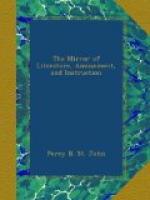P.T.W.
Quid pro quo.—A peasant of Burgundy, whom Louis XI. had taken some notice of, while Dauphin, appeared before him when he ascended the throne, and presented him with an extraordinary large radish; Louis received it with much goodwill, and handsomely repaid the peasant. The great man of the place, to whom the countryman related his good fortune, imagined that if he were to offer Louis something, he would, at any rate, make him a prince. Accordingly he went to court, and presented his finest horse to the king. Louis received his present as graciously as he had before taken the radish, and after he had sufficiently praised the horse, “See here,” said he, taking the radish in his hand, “here is a radish, which, like your horse, is one of the rarest of its kind; I present it to you with many thanks.”
Iota.
Muswell Hill derives its name from a famous well on the hill, where, formerly, the fraternity of St. John of Jerusalem, in Clerkenwell, had their dairy, with a large farm adjacent. Here they built a chapel for the benefit of some nuns, in which they fixed the image of our Lady of Muswell. These nuns had the sole management of the dairy: and it is singular, that the said well and farm do, at this time, belong to the parish of St. James, Clerkenwell. The water of this spring was then deemed a miraculous cure for scrofulous and cutaneous disorders. For that reason it was much resorted to; and, as tradition says, a king of Scotland made a pilgrimage hither, and was perfectly cured.
* * * * *
Printed and Published by J. LIMBIRD, 143, Strand, London; sold by ERNEST FLEISCHER, 626, New Market, Leipsic; and by all Newsmen and Booksellers.



